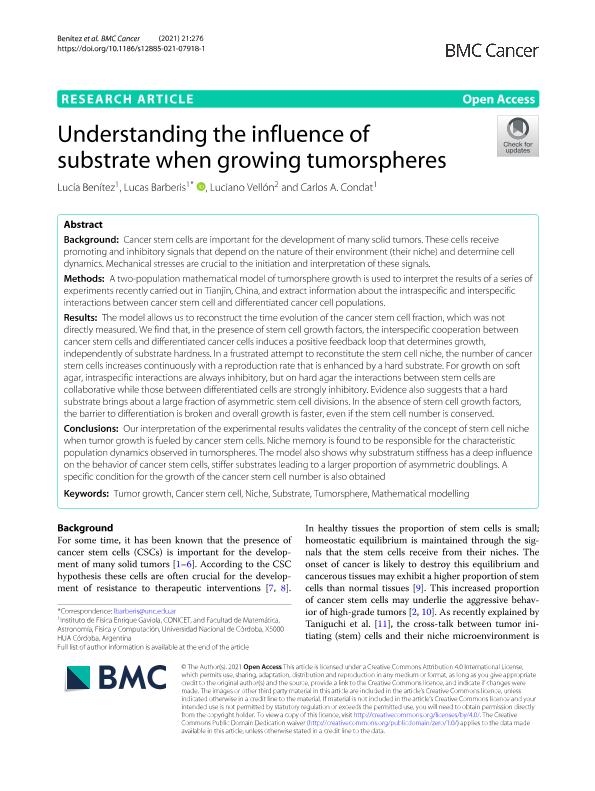Artículo
Understanding the influence of substrate when growing tumorspheres
Fecha de publicación:
12/2021
Editorial:
BioMed Central
Revista:
BMC Cancer
ISSN:
1471-2407
Idioma:
Inglés
Tipo de recurso:
Artículo publicado
Clasificación temática:
Resumen
Background: Cancer stem cells are important for the development of many solid tumors. These cells receive promoting and inhibitory signals that depend on the nature of their environment (their niche) and determine cell dynamics. Mechanical stresses are crucial to the initiation and interpretation of these signals. Methods: A two-population mathematical model of tumorsphere growth is used to interpret the results of a series of experiments recently carried out in Tianjin, China, and extract information about the intraspecific and interspecific interactions between cancer stem cell and differentiated cancer cell populations. Results: The model allows us to reconstruct the time evolution of the cancer stem cell fraction, which was not directly measured. We find that, in the presence of stem cell growth factors, the interspecific cooperation between cancer stem cells and differentiated cancer cells induces a positive feedback loop that determines growth, independently of substrate hardness. In a frustrated attempt to reconstitute the stem cell niche, the number of cancer stem cells increases continuously with a reproduction rate that is enhanced by a hard substrate. For growth on soft agar, intraspecific interactions are always inhibitory, but on hard agar the interactions between stem cells are collaborative while those between differentiated cells are strongly inhibitory. Evidence also suggests that a hard substrate brings about a large fraction of asymmetric stem cell divisions. In the absence of stem cell growth factors, the barrier to differentiation is broken and overall growth is faster, even if the stem cell number is conserved. Conclusions: Our interpretation of the experimental results validates the centrality of the concept of stem cell niche when tumor growth is fueled by cancer stem cells. Niche memory is found to be responsible for the characteristic population dynamics observed in tumorspheres. The model also shows why substratum stiffness has a deep influence on the behavior of cancer stem cells, stiffer substrates leading to a larger proportion of asymmetric doublings. A specific condition for the growth of the cancer stem cell number is also obtained
Archivos asociados
Licencia
Identificadores
Colecciones
Articulos(IBYME)
Articulos de INST.DE BIOLOGIA Y MEDICINA EXPERIMENTAL (I)
Articulos de INST.DE BIOLOGIA Y MEDICINA EXPERIMENTAL (I)
Articulos(IFEG)
Articulos de INST.DE FISICA ENRIQUE GAVIOLA
Articulos de INST.DE FISICA ENRIQUE GAVIOLA
Citación
Benitez, Lucia; Barberis, Lucas Miguel; Vellón, Luciano; Condat, Carlos; Understanding the influence of substrate when growing tumorspheres; BioMed Central; BMC Cancer; 21; 1; 12-2021; 1-11
Compartir
Altmétricas




